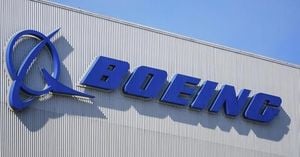Hong Kong's recent film releases and commercial ventures have provided notable boosts to the local economy, cementing the city's role as a cultural hub. One such development was the much-anticipated premiere of the animated feature "Ne Zha 2," which made waves on its opening day, alongside the launch of Taobao's inaugural physical store, attracting eager shoppers.
On Saturday, "Ne Zha 2" debuted across Hong Kong and Macau, quickly garnering HK$5.6 million (approximately US$720,620) on its first day. The film shattered attendance expectations, drawing over 64,000 viewers as families flocked to theaters. This cinematic phenomenon has become the highest-grossing film from China, amassing over US$1.8 billion globally since its release last month. According to reports by state-run China Central Television, the excitement led to more than 800 screening sessions across the two regions, more than doubling the initial projections of 500 showings.
At cinemas, children accompanied by their parents formed long queues. While stating the film’s attraction, Christine Fong Kwok-shan, district councillor of Sai Kung, noted her organization of three private screenings for residents, which sold out without delay. "I quickly bought 800 tickets, and they were gone just like the snap of my fingers! Many families were excited to watch this film together," said Fong, who highlighted the strong community support for the film.
Meanwhile, elsewhere in the city, the opening of Taobao’s first physical store, named PapaHome, drew crowds of furniture enthusiasts. Located at China Hong Kong City, Tsim Sha Tsui, this expansive store spans 2,322 square meters and features over 10,000 products from 100 Taobao merchants, allowing customers to experience and interact with items before deciding to purchase online. On its opening day, roughly 100 shoppers braved the queues, eager to peruse the offerings.
"I’ve never bought furniture from Taobao before, but I plan to spend around HK$5,000 (about US$640) on some new furniture," said James, one of the shoppers. His experience reflects the store’s aim to bridge the gap between online shopping and physical experience, enabling customers to test and examine products thoroughly.
The crowd control measures put in place allowed for orderly access to the store, facilitating smooth entry for visitors. People were not merely window-shopping; they interacted deeply with the products, scanning QR codes for prices and product details. Such direct engagement appears to play to Taobao's strategy of integrating offline experiences with its established online presence.
This dual success of "Ne Zha 2" and the Taobao store reflects broader trends within Hong Kong's economy. The film's stellar performance not only highlights regional interests but also strengthens the cultural fabric by encouraging family outings and communal viewing experiences. Simultaneously, the physical store heralds a shift toward experiential retail, potentially revitalizing local shopping sectors as consumer behaviors evolve post-pandemic.
The excitement surrounding these openings is palpable, with many Hong Kong residents expressing optimism about the resurgence of local business activities. The palpable energy at cinemas and stores suggests a growing confidence within the community to engage more fully with cultural and commercial pursuits.
Reflecting on this phenomenon, one must wonder whether this trend signals long-term growth or if it is merely circumstantial, spurred by the novelty of these developments. Nevertheless, for now, families are reveling together at the movies, and shoppers are rediscovering the joys of physical browsing, significantly impacting Hong Kong's economic atmosphere.



